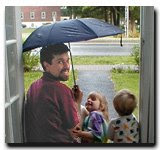Several readers have asked about solar space heaters, mentioned in my previous column (“Invest in Your House,” Sept. 4). With Maine’s solar home tour coming up on Saturday, Oct. 4, I thought this was a good time to cover solar energy, explaining solar space heaters along the way.
The sun is your most sustainable home heating option. Each acre of Maine receives solar energy equivalent to 163,648 gallons of #2 heating oil — every year. As Thomas Edison remarked, “I’d put my money on the sun and solar energy. What a source of power!”
If you live in a conventional home, you waste virtually all of the free energy the sun sends. Your roof and walls reflect solar energy, and your insulation blocks it. Your windows lose more energy than they admit. From a solar energy perspective, you live in a cave.
If you live in a modern solar home, by contrast, you enjoy free energy every sunny day. Your southern windows let in winter sun (awnings block summer sun). You have few, if any, energy-losing northern windows. Inside your home, your flooring and masonry heat up all day and radiate warmth all night.
Beyond the basic design of your house, you have several options for collecting and using solar energy.
- A solar space heater, a metal box similar in appearance to a large sky light on a wall or roof, heats and circulates air from inside when your building calls for heat.
- A solar hot water system heats and circulates a liquid (usually anti-freeze) to heat a water tank. Today’s systems can reliably keep water at 120˚, suitable for domestic uses such as showers but not suitable for baseboard space heating, which requires 180-degree water.
- Photovoltaic systems use solar panels to convert sunlight into electric power, which can be stored in batteries or shared with the grid.
Most people will find that a self-contained solar space heater, requiring no plumbing or electrical connections, is the most economical way to add solar heat to their homes.
Maine’s solar home tour in October is a great opportunity to visit Mainers who are harnessing the sun’s energy to heat and power their homes. You can learn more about the systems I’ve described and see them in action. For more information, visit www.FWHorch.com/gogreen.
Fred Horch is the founder of F.W. Horch Sustainable Goods & Supplies in Brunswick, providing practical products and trustworthy advice for sustainable living. Online at www.FWHorch.com


No comments:
Post a Comment